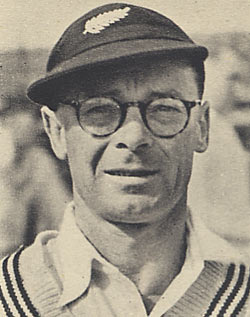Walter Hadlee
ESPNcricinfo staff
|
|

|
Wal Hadlee came to prominence as a tall, bespectacled 18-year-old in 1933- 34, hitting 97 and 74 not out for Canterbury against Wellington; an innings of 194 off the same opposition in January 1937 sealed his selection for that summer's tour of England. Hadlee topped 1,000 runs on the tour, and was unlucky to miss a century in his second Test, at Old Trafford, when he slipped after turning a ball from Arthur Wellard off his hip and was out hit wicket for 93. New Zealand had no more international exposure until after the war, during which Hadlee's poor eyesight kept him out of the firing line, and they started afterwards with a one-off Test against Australia in March 1946. Hadlee had just scored a defiant 198 against the tourists for Otago, and was named as captain. He bravely decided to bat first on a wet Wellington wicket, and was twice out in single figures as New Zealand were demolished for 42 and 54. Nonetheless, he retained the captaincy for England's visit the following year, for another solitary Test. This time he lost the toss, but found himself batting again anyway after Walter Hammond (a boyhood hero) decided to bowl first. Hadlee responded with a superb 116 - his only Test century - and this time avoided defeat, helped by bad weather. Though he was overshadowed in his New Zealand generation by Martin Donnelly, Hadlee remained a very fine batsman: "He was a classical right-hander," recalls John Reid, "tall, very forceful off the front foot, and scoring most of his runs forward of the wicket."
A move back to Canterbury - and a partnership in a cricket-friendly accountancy firm - ensured Hadlee's availability for the 1949 tour of England, and he duly took his place as captain on one of New Zealand's happiest, and most successful, overseas trips. On board ship, Bert Sutcliffe, a PE teacher, knocked the team into shape, and Hadlee, with his accountant's mind, laid out his plans in a little notebook, analysing potential opponents and setting targets for each player. All four Tests were drawn, helped by the decision to limit them to three days (after this, Test hours were standardised), and the New Zealanders lost just one match out of 35 - to Oxford. The captain was not a glamorous figure: "Stick-thin and headmaster-erect," recalled Frank Keating in The Guardian, "wearing a pair of severe nil-nil horn-rimmed spectacles." And some thought his captaincy had a touch too much of the accountant about it: his bowling changes were usually predictable. But by New Zealand's modest standards, the tour was a triumph and, as Hadlee said at a reunion 40 years later: "The team had a rapport that was for life." And he must get much of the credit himself: Wisden noted the unselfishness of his leadership, as did John Reid, who celebrated his 21st birthday in Taunton. "It was a very exacting tour. We were away from home for eight months, with a month on the boat each way either side of six months in England, where we played 30-odd games. But Walter Hadlee was an inspiration. He had a tremendous job to do. As well as batting, which he did pretty well, on that tour he had to make speeches at each county - and they had to be different, because we played some of them twice."
Hadlee played only nine more first-class matches, two of them Tests against Freddie Brown's England side in 1950-51, before retiring. He continued to play club cricket - increasingly, alongside his sons - and served on the New Zealand board between 1949 and 1981, including a long stint as chairman. In the 1982 Wisden, he called for South Africa's immediate return to international cricket, arguing that it had now achieved selection on merit, but world opinion had moved on. Hadlee was a frequent visitor to England, especially during New Zealand tours, and was happily on hand in 1990 when his son Richard collected the man of the match award in the Lord's Test just days after being knighted. No father could be prouder and, when Wisden chose its Five Cricketers of the Century in 2000, Walter argued and voted for Richard: "This has to be embarrassing for me. But there's a job to be done. I will cite the bare facts" - and he did, impressively. A later New Zealand captain, Martin Crowe, paid tribute: "Walter was a man I had the utmost respect and admiration for. He was always willing and happy to sit down and chat about the game. His story-telling of his playing days and his team-mates was superb, and his recollection of tours back some 70 years ago was quite astonishing." Those memories came in useful when Hadlee finally wrote his autobiography, The Innings of a Lifetime, in 1993.

